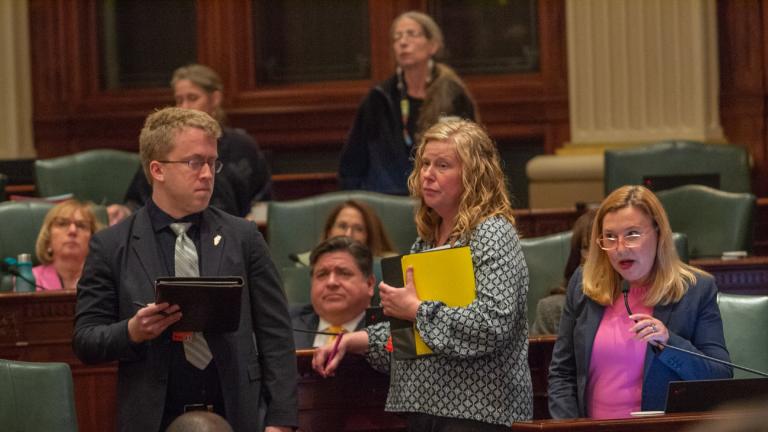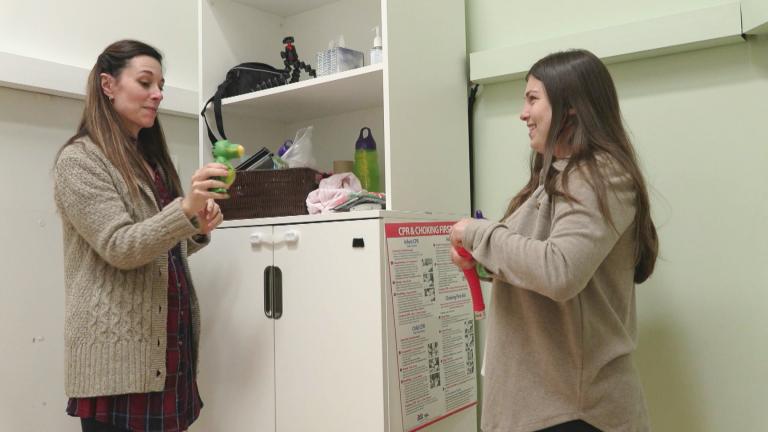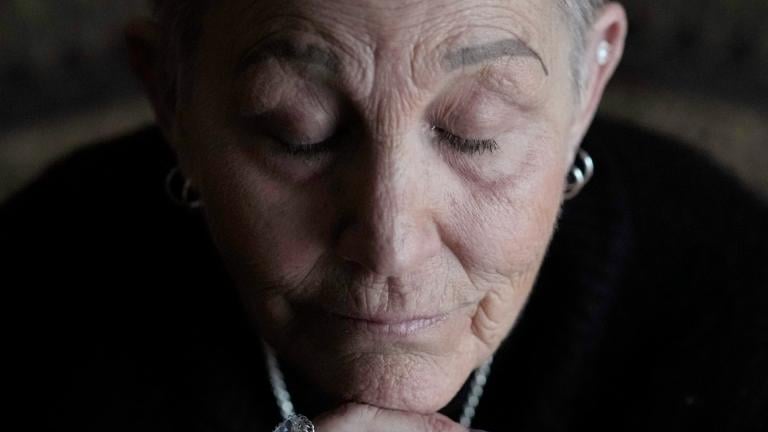On the day a local couple brought their second daughter home from the hospital, the husband was told he had the progressive neurodegenerative disease ALS — or Lou Gehrig’s disease.
At the time, he was given just six months to live. That was five years ago.
What Brian Wallach and his wife, Sandra Abrevaya, did after receiving that diagnosis gives new meaning to the advice to “get your affairs in order.”
From his living room in north suburban Kenilworth, Wallach speaks haltingly. The disease has weakened his voice, but he and his wife have a cadence for translation. She sits close to him, he speaks a few words, she repeats clearly.
“I feel OK. I’m a bit tired from all of the things. But my mind is racing at full speed,” Wallach said. “… How we do a [film] screening for the I AM ALS community. I’m thinking about how we improve our care delivery for Synapticure. And I am thinking about our parent-teacher conferences this afternoon.”
It’s his way of responding to his illness, which may have slowed his body, but not his mind.
“With every stressful situation my response is to go to work. And I do that because it gives me a sense of purpose that ALS is trying to take away, and it also gives me a sense of power when I have no control of the disease,” Wallach explains. “So for me, I want to go to work because it allows me to say, ‘Not today ALS.’”
The couple met working on Barack Obama’s historic 2008 presidential campaign.
Wallach says he and Abrevaya applied that organizing know-how to their fight against ALS.
Much of their journey is documented in the film, “No Ordinary Campaign.”
First, the pair started the nonprofit I AM ALS with the support of a number of medical professionals and colleagues.
Then, they took the fight to their old stomping ground. The film shows the couple in the earlier days of Wallach’s illness traversing Capitol Hill, meeting with Congress members and testifying before committees.
Between 2019 and 2021, they successfully lobbied congress to increase government spending on ALS research from $10 million to $80 million a year.
They also convinced Congress to pass legislation allowing people with ALS immediate access to disability benefits from Social Security without the requisite five-month waiting period, a time window that can close quickly on an illness like ALS.
Next, the group pushed the Food and Drug Administration to allow patients earlier access to promising, but experimental drug treatments.
“So if you can take one treatment and slow down your progression by 20%, and then take another treatment and slow it down by 10% and a third that slows it down by 20% more, you’ve taken a disease that most people pass away from in two to three years and make it a disease where people can live seven to 10 years,” Wallach says. “And that is everything. And that is how we end ALS.”
One of those drugs is Relyvrio, or AMX0035. It was approved by the FDA in late September.
“So we were able to help organize a campaign that made clear to the FDA that 10 more months of life for many people is living almost twice as long as their diagnosis gave them,” Wallach says. “And for someone like me, it means that I will be here another year to see my daughters grow up, and to spend time with [my wife].”
Relyvrio is the first ALS drug to gain approval in five years.
Along the way, journalist Katie Couric joined their list of supporters, becoming an executive producer on the film. She’s also someone who knows what’s it like to care for a husband facing a terminal illness.
“Their organizational skills and their experience as political operatives really gave them an in, in terms of understanding sort of the twists and turns of how to get legislation passed. That’s something I think the average person would be overwhelmed by,” Couric told WTTW News while in town for screenings of the film at the Chicago International Film Festival. “But because they had worked in the political realm, I think they were really well-situated to understand that dogged determination, how you get something done.”
The team around the film says it’s evidence of how much faster change is happening for the ALS community.
“What’s really tough is when you have a debilitating illness like ALS, there are few survivors, so you don’t have a built in network of people who are advocating,” Couric said. “But they have built a network and they have just brought together this whole community and whatever happens, this community is going to keep fighting.”
And every victory has given Wallach and Abrevaya hope that they can do more than beat the odds.
“I think Brian and I still do authentically believe we have a chance to survive it … and we appreciate that it’s just a chance that we could be among the first survivors and so, we’re gonna fight for that every day for ourselves, for our girls, and for everybody else involved,” Abrevaya said.
Not just for themselves, but for anyone facing a debilitating neurodegenerative illness. And the two daughters Wallach desperately wants to see grow up.
“Well I want to be there to share with them how we fought and how we made ALS a disease that people can live with … because I know that they will grow up to be incredible people and I want to be here to see that,” he said.
The couple also started a telemedicine company this year, Synapticure, to provide personalized care to ALS and Parkinson’s patients, as well.
Also in the couple’s corner, TV creator, writer and producer Phil Rosenthal — most widely known for creating the TV hit “Everybody Loves Raymond.” He also serves as an executive producer for No Ordinary Campaign.
He’s donating proceeds of his cookbook “Somebody Feed Phil: The Book” to I Am ALS.
Find a recipe from the book below.








